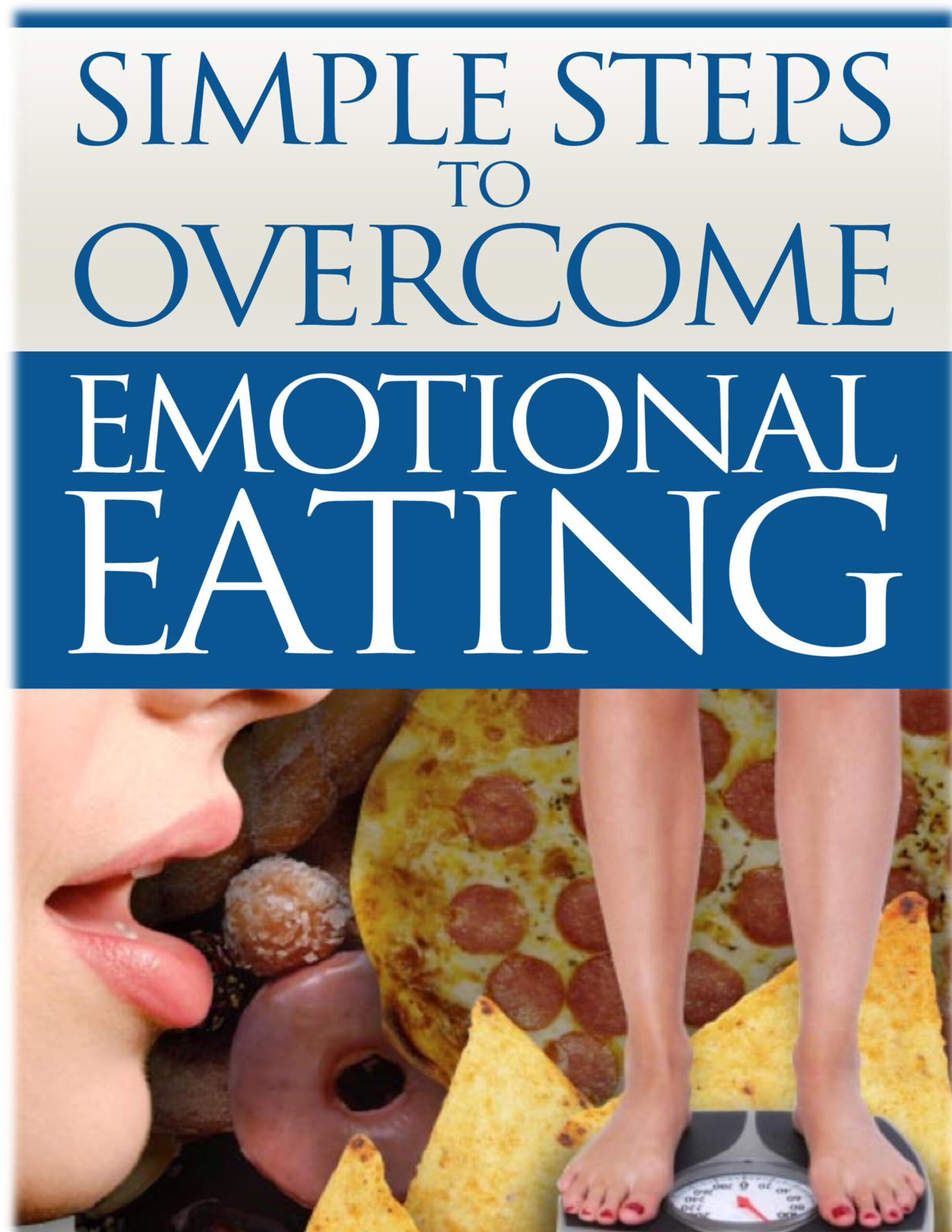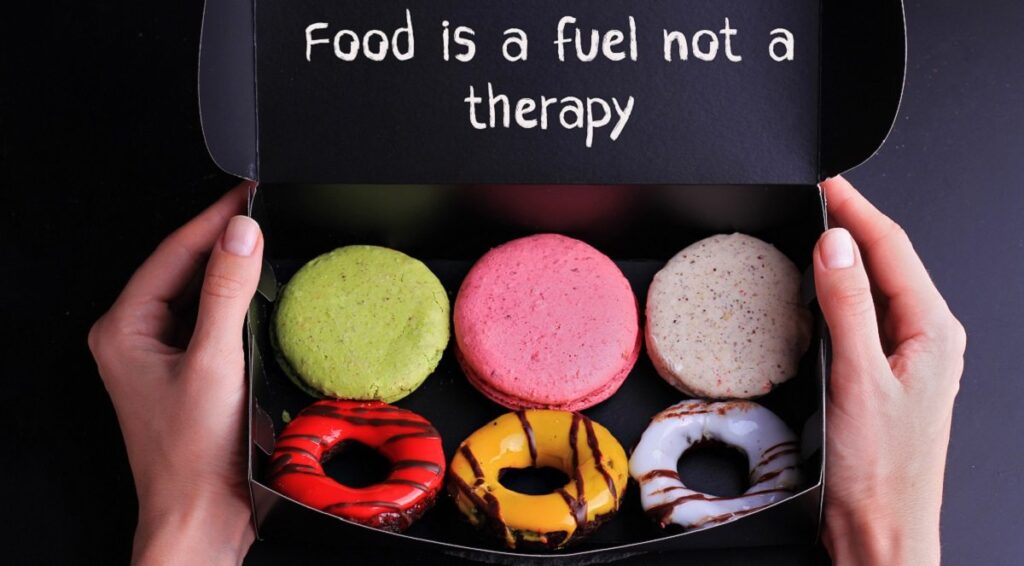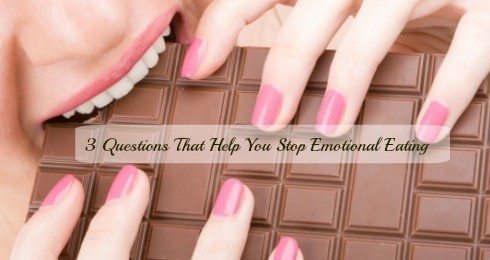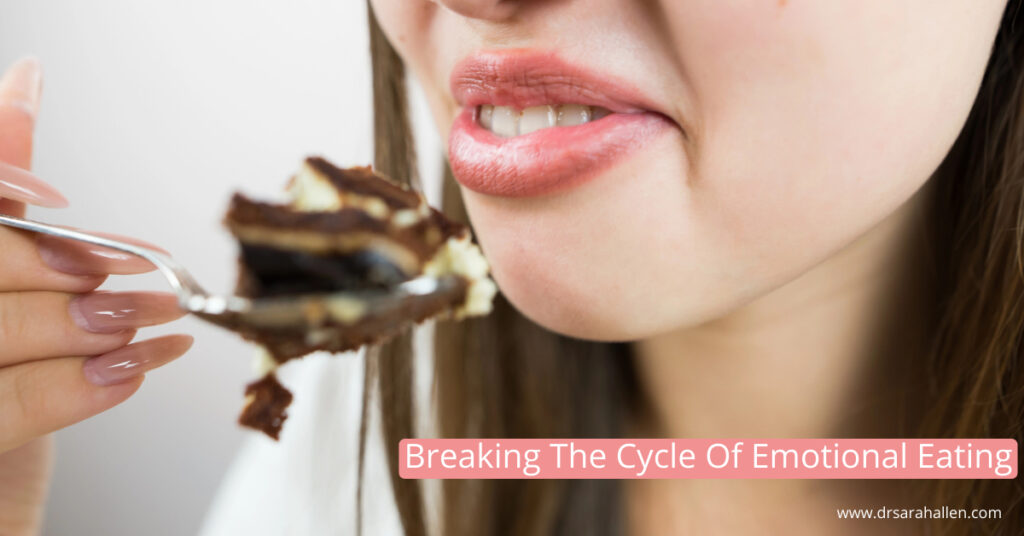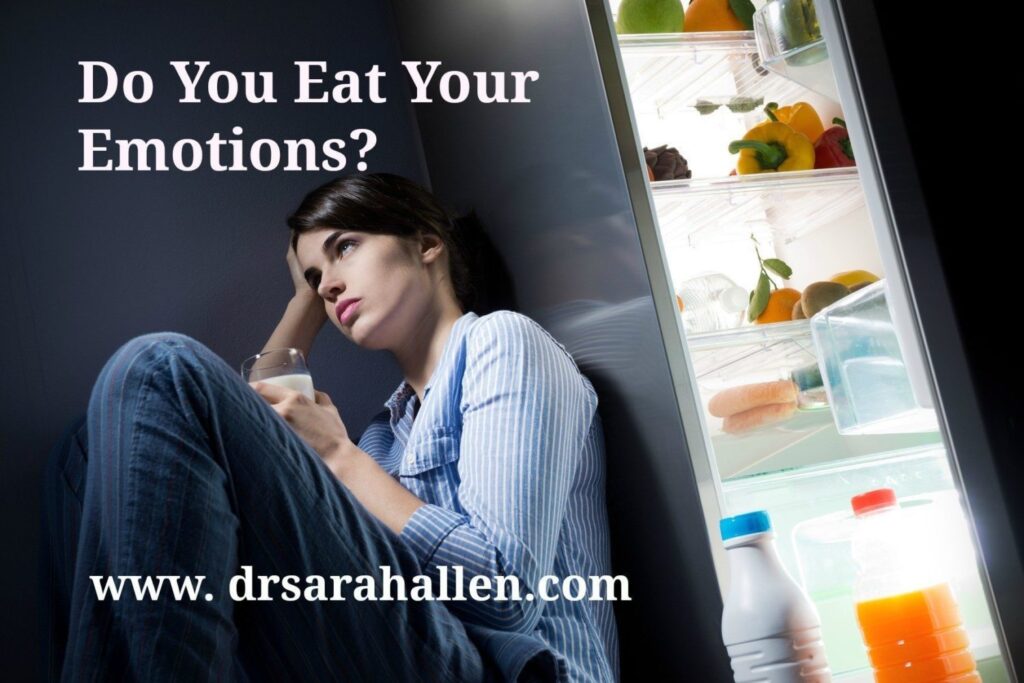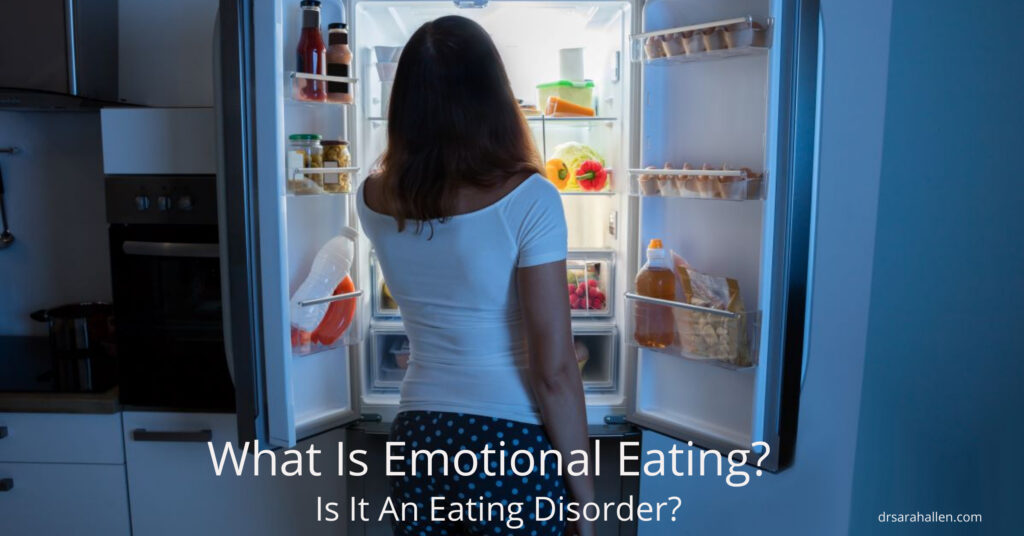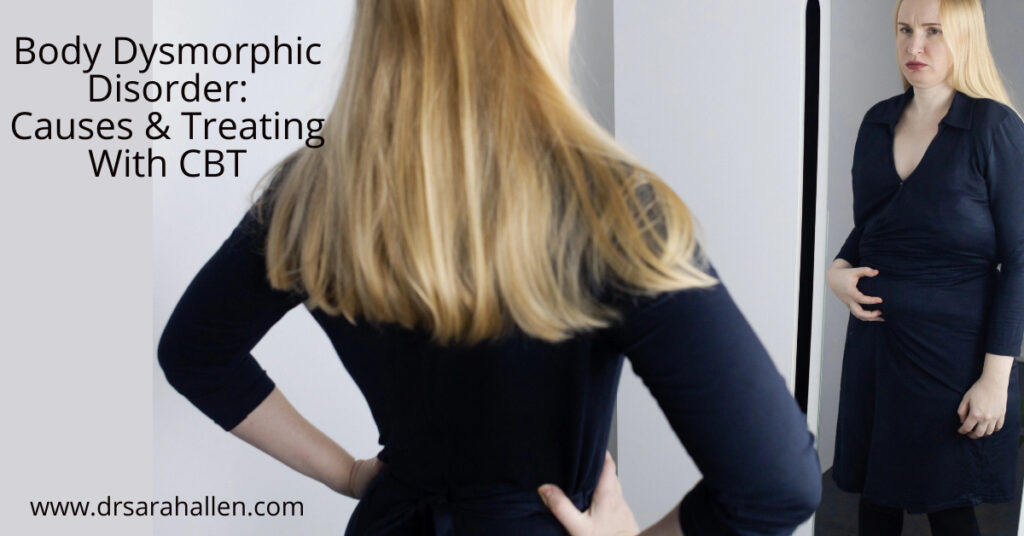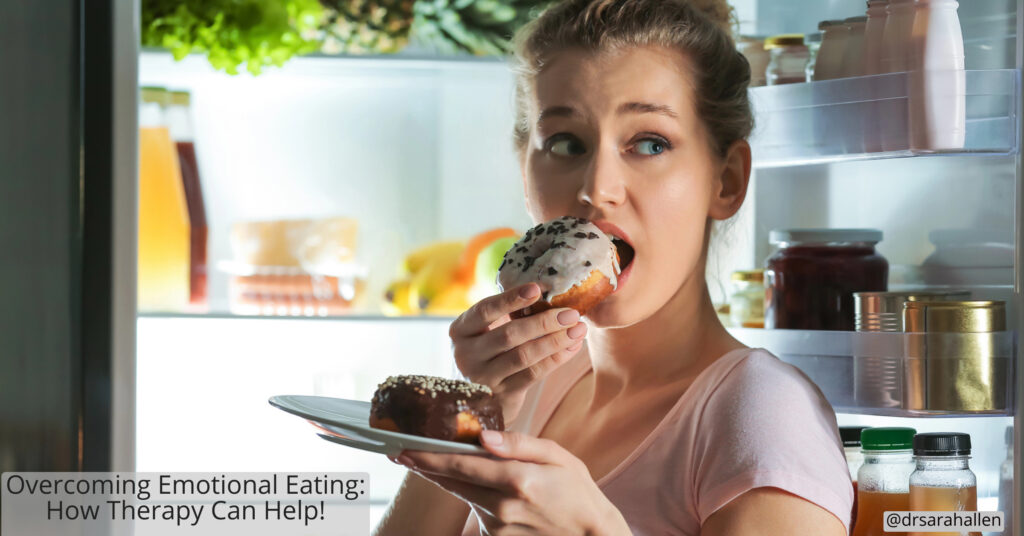
Emotional eating can be a seemingly inescapable cycle that sabotages our health and well-being. It is characterized by consuming food in response to emotions, such as stress, anxiety, sadness, or even boredom, rather than hunger or nutritional needs. We all are emotional eaters sometimes but it becomes a problem when you frequently turn to food for comfort, to fill a void, or to cope with overwhelming emotions. Unfortunately, this coping mechanism does not truly address the root of emotional distress, and it often leaves people even more stressed, guilty, and physically uncomfortable as a result.
If you recognize that you are an emotional eater, you may be wondering how to break the cycle. One effective solution is seeking the help of a mental health professional who specializes in emotional eating, like myself, as we can provide guidance and support through therapy. Cognitive-behavioral therapy, in particular, has been recognized as an impactful intervention to help change the thought patterns and behaviors that contribute to emotional eating.
This blog post aims to delve into the ins and outs of emotional eating, explore how therapy can help, and share practical tips to begin your journey toward building a healthier relationship with food. Firstly, I will explain what emotional eating is, the factors that contribute to it, and how to identify its signs and triggers. Subsequently I will focus on the various therapeutic approaches that can help in combating emotional eating, such as cognitive-behavioral therapy, mindfulness practices, and self-compassion techniques.
Understanding Emotional Eating
Emotional eating is a complex issue that can be difficult to identify and even more challenging to overcome. At its core, it involves turning to food as a way to manage emotions rather than for nourishment or enjoyment. This often means using food as a source of comfort, distraction, or reward in response to negative emotions such as stress, anxiety, or sadness. Emotional eaters tend to crave high-calorie foods, like sweets or junk food, which provide a temporary “feel-good” sensation, only to be followed by feelings of guilt or regret.
To identify emotional eating, it’s essential to observe the situations in which you’re most likely to turn to food for comfort. This can include times when you’re feeling overwhelmed, emotionally drained after a long day, or struggling to process difficult emotions. By becoming aware of these triggers, you can begin to recognize the pattern of emotional eating and take steps to break the cycle. I have two questionnaires that can help you identify whether you are an emotional eater and what type of emotional eater you are in my free booklet Simple Steps To Overcome Emotional Eating which you can sign up for on my Emotional Eating Treatment page or towards the end of this page.
Cognitive-Behavioral Therapy: Changing Your Thoughts and Behaviors
One effective approach to overcoming emotional eating is cognitive-behavioral therapy (CBT). CBT is a type of talk therapy that focuses on identifying and modifying unhelpful thinking patterns and behaviors. This can be especially useful in helping you understand the thoughts and beliefs that lead to emotional eating and replacing them with healthier coping mechanisms.
In a CBT session, I will work with you to identify the thoughts and emotions that trigger emotional eating, such as negative self-talk or feelings of failure. Together, we’ll explore the reasons behind your emotional attachment to food and develop healthier coping strategies to manage stress and emotions. Common CBT techniques include journaling, challenging negative thoughts, and learning problem-solving skills. Some people love journaling, and others don’t, and we will find the tools that work best for you.
Mindfulness Practices: Fostering a Healthier Relationship with Food
Mindfulness, or being present and fully engaged with each moment, is another therapeutic technique that can be transformative in addressing emotional eating. Practicing mindfulness can help you become more aware of your hunger and satiety cues, as well as the emotions that trigger your eating behaviors.
To incorporate mindfulness into your eating routine, take time to savor each bite, pay close attention to the flavors and textures, and notice how the food makes you feel. By doing this, you can foster a healthier relationship with food, learning to appreciate and enjoy it for its nourishment and pleasure rather than using it as a coping mechanism. Additionally, consider incorporating meditation or mindfulness exercises into your daily routine to help manage stress and improve your overall emotional well-being.
Building a Support System and Establishing New Habits
It’s crucial to recognize that overcoming emotional eating doesn’t happen overnight, and it’s essential to have an established support system to aid your journey. This can include myself, trusted friends and family, who can offer encouragement and accountability, particularly during times of stress or emotional upheaval.
Furthermore, establishing new habits can help replace emotional eating with healthier coping strategies. Consider implementing regular exercise, which can release mood-enhancing endorphins and serve as an effective stress-reducer. Experiment with new hobbies, like painting or gardening, to find activities that provide a sense of satisfaction and enjoyment. And remember to practice self-compassion, acknowledging that emotional eating is a learned behavior that will take time to unlearn. What time of day you tend to emotionally eat is also important as we can find the best ways to help you when you are most likely to be triggered.
Embracing Your Journey Toward Emotional Healing
Breaking the cycle of emotional eating is a journey that takes time, patience, and persistence. By understanding the factors that contribute to emotional eating, engaging in therapeutic modalities such as cognitive-behavioral therapy and mindfulness, and building a support system to foster new habits, you can regain control of your eating behavior and your emotional well-being.
While it may be challenging to confront and address emotional eating, it’s essential to remember that it’s an opportunity for personal growth. As you learn to manage your emotions in a healthier manner and nurture a more balanced relationship with food, you’ll cultivate resilience, self-awareness, and a renewed sense of well-being that can be very empowering. If you are experiencing an unhealthy relationship with food that gets in the way of you enjoying your life, please remember you are not alone and support is available and will help!

I specialize in empowering you to have the relationship with food that you want, rather than weight and food issues controlling you. If you have any questions, or would like to set up an appointment to work with me, please contact me at 847 791-7722 or on the form below.
If you would like to read more about me and my areas of specialty, please visit Dr. Sarah Allen Bio. Dr. Allen’s professional license only allows her to work with clients who live in IL & FL & the UK and unfortunately does not allow her to give personalized advice via email to people who are not her clients.
Dr. Allen sees clients in person in her Northbrook, IL office or remotely via video or phone.

What Can I Read That Helps Me While I Am Waiting For My First Appointment With Sarah?
Sign up for the Emotional Eating booklet.
Download this free booklet to gain valuable insights and learn practical strategies for managing your relationship with food.
